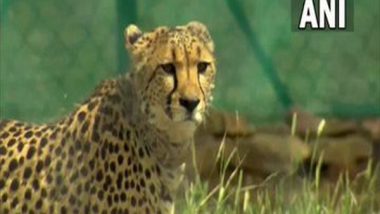New Delhi [India], January 27 (ANI): South Africa on Friday signed a Memorandum of Understanding (MoU) on cooperation in the re-introduction of Cheetahs in India to establish a viable cheetah population in the Asian country.
"South Africa and India signed an MoU on cooperation in the re-introduction of Cheetahs in India. In terms of MoU, the initial batch of 12 cheetahs is to be flown from South Africa to India in February 2023. MoU terms to be reviewed every 5 years," read the Ministry of Environment, Forest and Climate Change press release.
Restoring cheetah populations is considered to be a priority for India and will have vital and far-reaching conservation consequences, which would aim to achieve a number of ecological objectives, including re-establishing the function role of Cheetahs within their historical range in India and improving the enhancing the livelihood options and economies of the local communities.
Following the import of the 12 Cheetahs in February, the plan is to translocate a further 12 annually for the next eight to 10 years.
The MoU on Reintroduction of Cheetah to India facilitates cooperation between the parties to establish a viable and secure cheetah population in India; promotes conservation and ensures that expertise is shared and exchanged, and capacity built, to promote cheetah conservation, added the release.
This includes human-wildlife conflict resolution, capture and translocation of wildlife and community participation in conservation in the two countries.
In terms of the MoU, the countries will collaborate and exchange best practices in large carnivore conservation through the transfer of technology, training of professionals in management, policy, and science, and establish a bilateral custodianship arrangement for cheetah translocated between the two countries, read the release.
The initiative to reintroduce cheetah to a former range state following the local extinction of this iconic species due to overhunting and loss of habitat in the last century is being carried out following the request received from India.
This multi-disciplinary international programme is being coordinated by the Department of Forestry, Fisheries and the Environment (DFFE) in collaboration with the South African National Biodiversity Institute (SANBI), South African National Parks (SANParks), the Cheetah Range Expansion Project, and the Endangered Wildlife Trust (EWT) in South Africa together with the National Tiger Conservation Authority (NTCA) and the Wildlife Institute of India (WII).
Earlier, eight cheetahs brought from Namibia were released by Prime Minister Narendra Modi at Kuno National Park on the occasion of his birthday on September 17, 2022.
Radio collars have been installed in all the cheetahs and monitored through satellite. Apart from this, there is a dedicated monitoring team behind each cheetah that keeps monitoring the location for 24 hours.
Under the ambitious project of the Indian Government-Project Cheetah- the reintroduction of wild species particularly cheetahs is being undertaken as per the International Union for Conservation of Nature (IUCN) guidelines.
India has a long history of wildlife conservation. One of the most successful wildlife conservation ventures 'Project Tiger' which was initiated way back in 1972, has not only contributed to the conservation of tigers but also to the entire ecosystem.
In 1947-48, the last three cheetahs were hunted by the Maharaja of Korea in Chhattisgarh and the last cheetah was seen at the same time. In 1952 the Government of India declared Cheetahs extinct and since then Modi government has restored cheetahs after almost 75 years. (ANI)
(This is an unedited and auto-generated story from Syndicated News feed, LatestLY Staff may not have modified or edited the content body)













 Quickly
Quickly

















